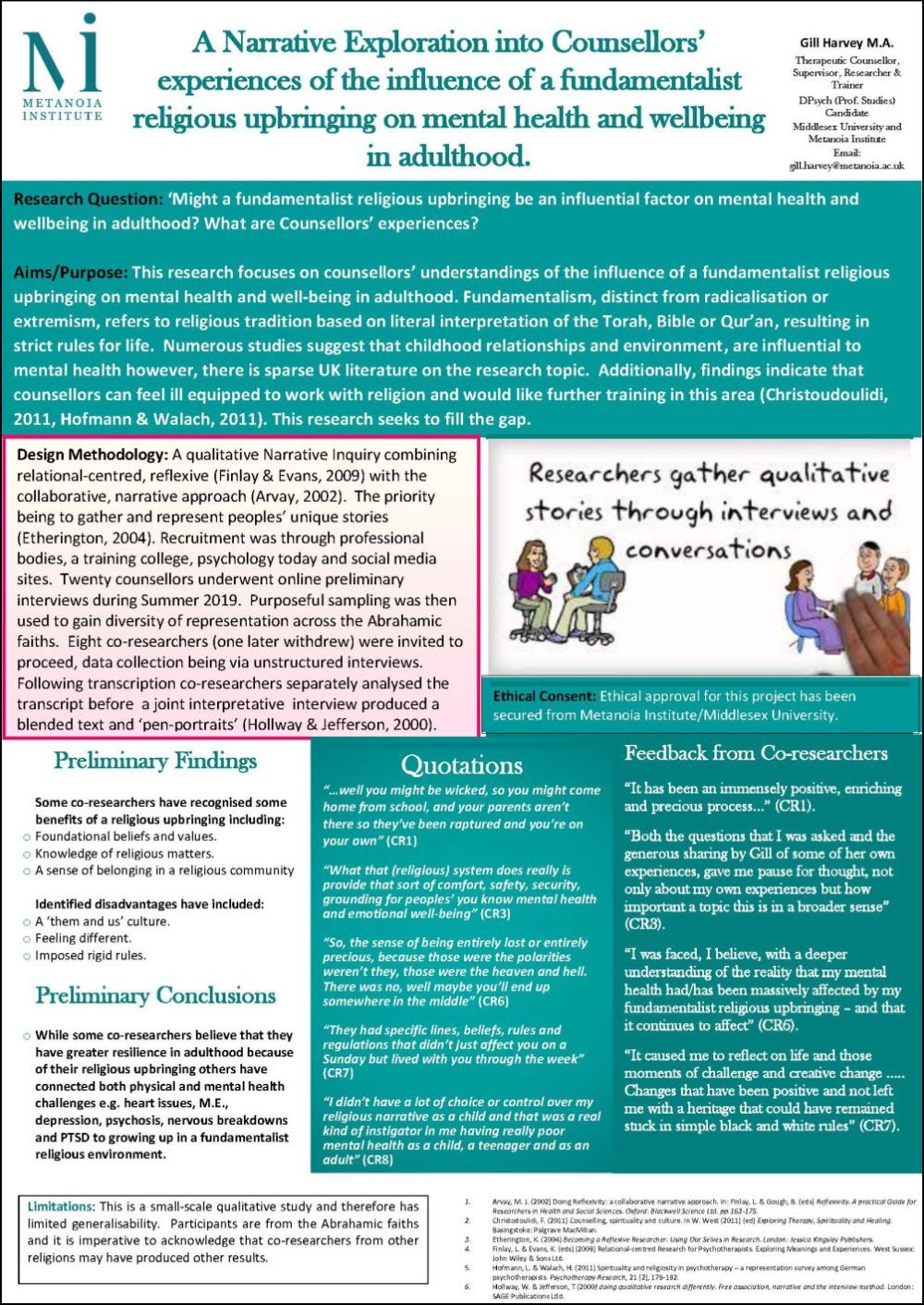
Aims or purpose
This research focuses on counsellors’ understandings of the influence of a fundamentalist upbringing on mental health. Fundamentalism, distinct from radicalisation or extremism, refers to religious tradition based on literal interpretation of the Torah, Bible or Qur’an, resulting in strict rules for life. Numerous studies suggest that childhood relationships and environment are influential to mental health however, there is sparse UK literature on the research topic. Additionally, findings indicate that counsellors can feel ill equipped to work with religion and would like further training in this area (Christoudoulidi, 2011; Hofmann & Walach, 2011). This research seeks to fill this gap.
Design and methodology
This is a qualitative Narrative Inquiry combining relational-centred reflexivity (Etherington, 2004) with the collaborative narrative approach (Arvay, 2002). Recruitment was through professional bodies, a training college, psychology today and social media sites. Twenty counsellors underwent online preliminary interviews during Summer 2019. Purposeful sampling was then used to gain diversity of representation across the Abrahamic faiths. Eight co-researchers were invited to proceed, data collection being via face-to-face, unstructured interviews. Following transcription, co-researchers will separately analyse the transcript before a joint interpretative interview produces a blended text and ‘pen-portraits’ (Hollway & Jefferson, 2000).
Ethical consent
Ethical approval for this project has been secured from Metanoia Institute/Middlesex University.
Preliminary results and findings
To-date all co-researchers recognised some benefits e.g. foundational beliefs and values, knowledge of religious matters and a sense of belonging. Disadvantages identified include a ‘them and us’ culture, feeling different and imposed rigid rules. All connected mental health challenges e.g. depression, psychosis and nervous breakdowns to growing up in a religious context.
Research limitation
This is a small-scale qualitative study and therefore has limited generalisability. Participants are from the Abrahamic faiths and it is imperative to acknowledge that co-researchers from other religions may have produced other results.
Preliminary conclusions and implications
These suggest that mental health difficulties can be rooted in feeling different, a ‘them and us’ culture and imposed rigid rules. However, benefits have also been acknowledged e.g. foundational beliefs and values, knowledge of religious matters and a sense of belonging which can aid mental health. UK based research in this area is required with psychoeducation for professionals being regarded as crucial.
References
Arvay, M. J. (2002) Doing Reflexivity: a collaborative narrative approach. In: Finlay, L. & Gough, B. (eds) Reflexivity. A Practical Guide for Researchers in Health and Social Sciences. Oxford: Blackwell Science Ltd. pp.163-175.
Christodoulidi, F. (2011) Counselling, spirituality and culture. In W. West (2011) (ed) Exploring Therapy, Spirituality and Healing. Basingstoke: Palgrave Macmillan.
Etherington, K. (2004) Becoming a Reflexive Researcher: Using Our Selves in Research. London: Jessica Kingsley Publishers.
Hofmann, L. & Walach, H. (2011) Spirituality and religiosity in psychotherapy – a representative survey among German psychotherapists. Psychotherapy Research, 21 (2), 179-192.
Hollway, W. & Jefferson, T (2000) doing qualitative research differently. Free association, narrative and the interview method. London: SAGE Publications Ltd.
Views expressed in this article are the views of the writer and not necessarily the views of BACP. Publication does not imply endorsement of the writer’s views. Reasonable care has been taken to avoid errors but no liability will be accepted for any errors that may occur.
